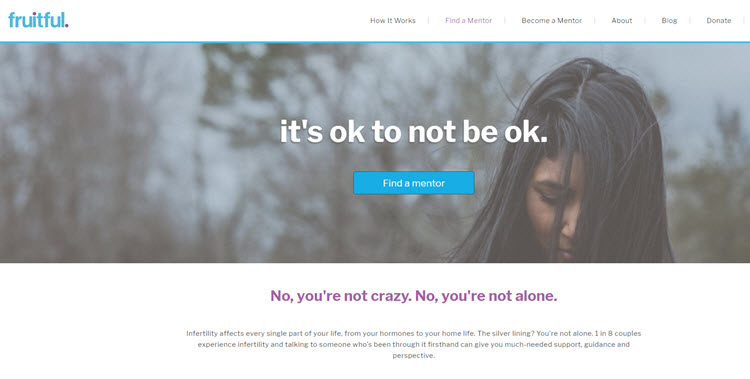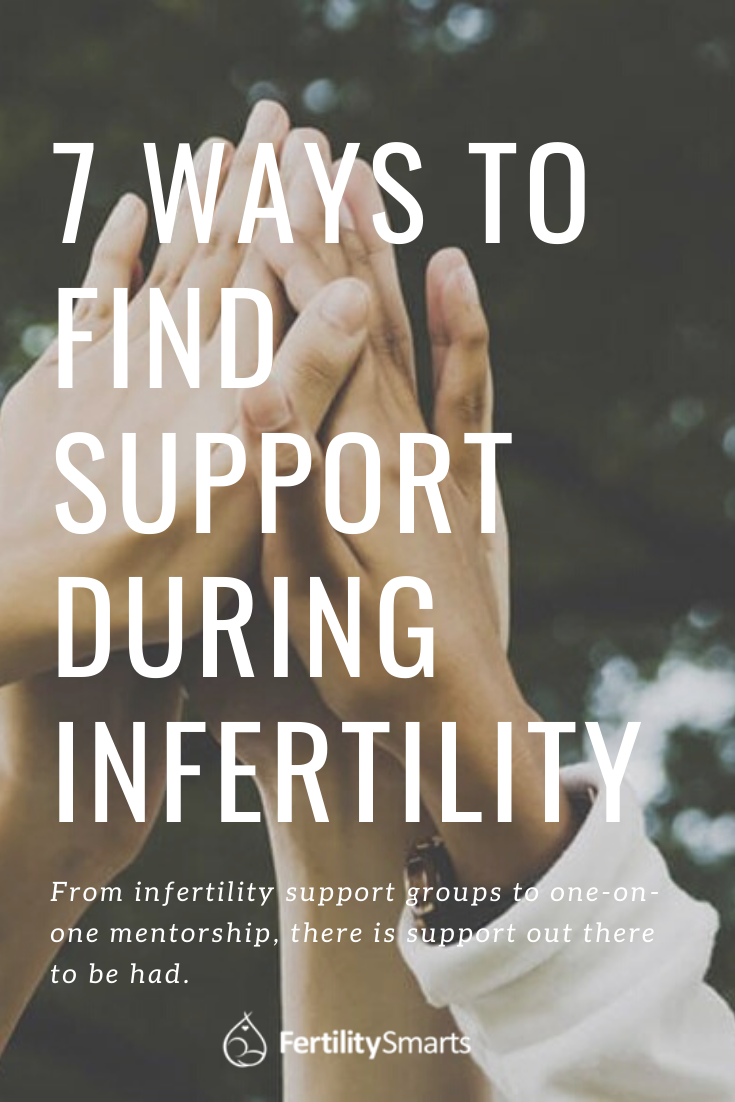Experiencing infertility and working towards a resolution is often experienced as a major life crisis. The physical, emotional, financial toll is significant—so much so that one study found that individuals experiencing infertility suffered similar psychological symptoms as those with other serious medical conditions such as cancer.
On top of this, infertility is often experienced as a private matter. It can be a tough topic for family and friends to relate to and can leave well-meaning people giving painful advice (just wait and it will happen!).
This means it can often feel like a very lonely experience—but it doesn't need to be.
There is support out there to be had. There are people who can relate and understand.
You don't need to feel alone.
So how do you find your infertility confidant? There are a number of different ways you can choose to connect with others. You get to decide what support means to you; it's not a one-size-fits-all deal.
Here is our list of some of the different types of support you might choose to take advantage of.
1. Chat With Someone In-The-Know
When you just want to talk with someone who has been there and injected that, a mentor might be a good bet. With Fruitful Fertility, you can be matched with a seasoned infertility veteran who shares similar values. Your mentor will have resolved their infertility and has the bandwidth to focus on your journey.
According to Fruitful, you can connect via phone, email, text, or even in person, with the goal of building trust and rapport over time. It can be powerful to navigate the experiences of infertility with someone who has been there.

2. Gather With People In a Similar Situation
If meeting in-person with a community of understanding people is what you need, a support group might be for you. Support groups can be a great way to get out of the house on the regular and meet with other people undergoing a similar experience. As a bonus, you could end up with some new friends, too.
If you are looking to join a group, there are national infertility-focused organizations that are a good first step. They typically offer peer-led support groups run primarily through volunteer support and might offer professionally-led support groups that are fee-based.
National Infertility Support Groups
Great places to also check for a local support group can include:
- Religious organizations
- Fertility clinics
- Hospitals or local health agencies
3. Find Your Tribe Online
The Fertility Tribe offers a free online community that brings together women who are struggling to get or stay pregnant. The app is organized by topic, making it easy to share stories, find support, and connect with resources. We also like that you can find other people dealing with a similar diagnosis.
If you are looking for a true community feel, the Fertility Tribe Members' Community is a great option.
A paid version is also offered that gives members additional perks.

4. Milestone Support & Celebration on Instagram
If you are not sure about needing support-support, but dang it, you just want to shout from the rooftop that you've just "pulled the trigger," there is a solution for that.
Instagram has an infertility community where other people understand your ups and downs—all with the option to remain anonymous.
We find that because most people are invested in sharing their stories and having others reciprocate, the anonymous jabs that frequent other spaces on the internet don't seem to land as frequently here.
Throw in a mix of inspiration and humor, and that's the full Instagram #ttc experience.
How to Get Started on Instagram
How do you get started? Well, hit up Instagram with a 'TTC account' and decide what level of privacy you are most comfortable with. It's pretty common to see accounts set to private with a "TTC Accounts Only" disclaimer in the bio.
Then you need to find some hashtags to follow, and off you go. A great place to start is looking at #infertility and #infertilitysupport.
Oh, and we'd love for you to join us on Insta, too!
5. Treatment or Diagnosis-Specific Support
Perhaps you have a unique situation or the desire to focus on a specific aspect of your experience, well—we bet there is a Facebook group for that. Most of these groups are private (so your friends and family don’t need to know), and hopefully most of the content is relevant to your situation.
If you are looking for support with a diagnosis like secondary infertility or 40+ age group, this is a good bet.
Along the same lines, you might consider "old-school" messageboards. There are a number of online message boards to consider if you value the anonymity and the flexibility to seek support on your own schedule. Like Facebook groups, they also tend to have sections that focus on specific topics.
- Inspire offers RESOLVE-endorsed discussion groups on specific tops from newly diagnosed to the male perspective.
- Reddit also has an active infertility community.
Messageboard Considerations
Criticisms of messageboard-style groups are that they can be repetitive and hard to search through. It can also be more difficult to connect with other people depending on the size of the group.
It also isn't uncommon to find specific rules in various communities. For example, some ask you to use medical terms and not TTC language like "embaby" or they limit topics like pregnancy announcements. It's likely that the community standards will be posted or pinned in an easy to find location.
Lastly, everybody is likely already familiar with the fact that people can act like fools when anonymous. It is unfortunate, but it happens.
6. Listen to or Read About Other People's Experiences
Not a sharer? No worries. There are many great blogs and podcasts out there where people speak about their own experiences and round up others who have information or experiences to share.
You can follow along on during your daily commute and perhaps have an "Ah-ha" or "Oh, that is so relatable" moment along the way. It can be reassuring to see other people in similar situations share similar feelings.
How to get started? Well, we have an extensive list of blogs and podcasts on our Top Fertility Blogs that can be sorted by topic.
7. Seek Out Professional Experience
If you are looking for help exploring decisions relating to alternative family building, dealing with grief, struggling as a couple, or just think that it’s the right time, perhaps you are looking for professional support.
There are mental health professionals that specifically focus on the many issues related to assisted reproduction, trying to conceive and pregnancy loss. If you are in need of professional guidance, it's a good idea to look for someone who specifically works in the area.
The Mental Health Professional Group for the American Society for Reproductive Medicine (ASRM) suggest the following guidelines as minimum qualifications for mental health professionals working in reproductive medicine:
- Graduate degree in a mental health profession
- License to Practice
- Training in the medical and physical aspects of infertility
- Clinical experience (one year)
- Participation in continuing education
Whatever your preference for infertility support, know that you do not need to feel alone. There is support to be had!
